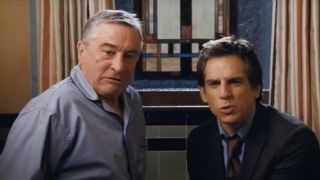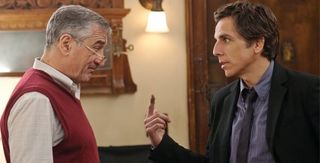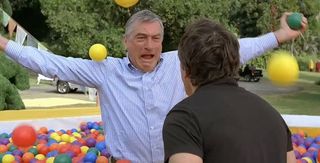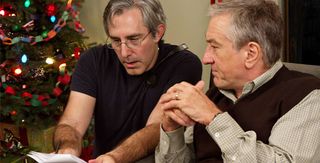Interview: Little Focker's Robert De Niro And Ben Stiller

The third installment of the Meet the Parents series, Little Fockers, is about to hit theaters and the Byrnes family “Circle of Trust” is still intact – well kind of. Turns out Dr. Bob couldn’t live up to Jack’s (Robert De Niro) expectations, so now Jack is keeping an even sharper eye on Greg (Ben Stiller). Greg keeps telling Jack that he and Pam (Teri Polo) have their own thing going on and it works, but now that Kevin is back in the picture and Greg is spending a lot of time with the beautiful drug rep Andi Garcia (Jessica Alba), Jack is on high alert.
The press conference with Ben Stiller and Robert De Niro was the exact opposite of the one with their co-stars Owen Wilson and Dustin Hoffman; it was quite orderly. The press may not have received any French fries, but the actors did have quite a lot to say about their experience making Little Fockers and some of the messages it’s trying to get across. Check out what they had to say about filming their big fight scene, getting back into character for round three and much more in the interview below.
Would you say this film is a roadmap for marriages that have bumps and curves down the road?
Ben Stiller: I feel like it definitely related to reality and we tried to take all of our experiences and have them be a part of what the story was. That's sort of like the idea of the movie; how do we tell a new story with these characters and where would they be 10 years down the road with the marriage, the kids and how that affects the marriage? So, that was the core idea for the movie, and we also wanted it to be organic and try to feel like there was a reason to tell the story. Hopefully there are some relatable elements in there in terms of juggling life and all the elements of life.
Robert De Niro: I would say that's why people like the film – I hope this one too - because of the story, the situation, the family dynamic, one family meeting another. It's like going into territory you have to deal with. Part of you is saying, "Why am I here?" But you have to be there. You’re with this other family and you have to deal and I think anybody can relate to that.
This is the third go-around. What do you guys look forward to most when you start a new Fockers movie? Is it seeing old friends, is it re-inhabiting the characters? What gets you the most excited?
Stiller: For me it's definitely getting to work with all the actors again. And getting the script to a place where it felt like, okay, this was a new situation and to see Jack and Greg's relationship having evolved and seeing a new dynamic where Greg’s gotten to the point where he’s a little more confident in himself and then having to deal with this situation of Jack losing confidence in him and where he's at, how he reacts differently. Just being able to see that play out, that was exciting for me. But basically just being able to come back and work with all these actors and the team; I really enjoy these people. It's always fun to have a chance to work with Bob.
CINEMABLEND NEWSLETTER
Your Daily Blend of Entertainment News
De Niro: We have fun; I enjoyed it a lot. When you're doing comedy I have less restrictions or constrictions. You can either just cut the thing out or the director will say to try something else or that’s not working, it’s too broad or whatever. There's more room for just having fun in a certain way.

With the fight scene, how much of that did you guys actually do and what’s it like to punch Robert De Niro and Ben Stiller in the face?
Stiller: [Laughs] We did a fair amount, but obviously it's a movie fight. The ball pit stuff was all real. It's a very strange environment to be in, a ball pit. They're not very hygienic either. Ball pits are all giant petri dishes. That stuff was all really fun and the bouncy house was challenging. I pulled a muscle; I'm not going to say which muscle, but I pulled a muscle. [Laughs]
De Niro: Did we leave the take off on The Wrestler?
Stiller: Yeah, yeah.
De Niro: Where I had to go down and when you hit the ball pit, you have to watch out because your back. It’s not as easy as it seems, so I did it from a short distance and the stunt guy [did it higher].
Stiller: Yeah, it's hard to get your equilibrium. Those are environments that are made for children, not older gentlemen like ourselves.
Mr. De Niro, it's so nice to see Harvey Keitel in this movie. How’d he come aboard to begin with and what was that scene like to do?
De Niro: It seemed like a good thing for Harvey to be in it and everyone was okay with it and that’s how it went.
Was it a lot of fun?
De Niro: Yeah, it was fun. When you have different people with different styles of working, sometimes you’ve got to get around that stuff so we do that and Harvey is one of my oldest, dearest friends, so we had to get all that working. It was good though, terrific.
How would you describe yourself as a son-in-law and father-in-law?
De Niro: Oh god. Ben, do you want to?
Stiller: It’s funny, I think I try to be my best possible self with my father-in-law and I think I'm okay at it, but it's definitely one of those relationships where you're always aware of the dynamic that's there. But we're pretty friendly. I think I’m okay. I think if you're a good husband then that makes you a good son-in-law.
De Niro: I feel the same way. I'm not like the character; I'm less stern about those things, but I'm still - watchful. [Laughs]

Going back to the physicality of the ball pit fight, what's the most painful scene in any comedy film you've done where you’ve literally suffered for your art?
Stiller: I don’t know. Whatever you're doing when you do it, you’re doing it and you don't think about it. Sometimes there's that feeling like, ‘Well, this isn't real because it's in a movie,’ even though it is real, it's happening to you. I can't think of anything that was actually physically painful. I’ve been in some lonely moments. A couple of scenes in There's Something About Mary where I was like, "Wow, I'm just here doing this by myself." I remember one scene in particular...
De Niro: Oh, was that the one in the bathroom? [Laughs]
Stiller: I remember shooting that scene and going, ‘Okay, I'm doing the scene,’ and all of a sudden nobody was around, they were all just far away and I just hear from far away, "Action."
What do you think about the qualities laid out for being a Godfocker? Do you think those qualities are realistic and are things you’d like to see in a son-in-law? Is it just providing security and a house for your children or are there other things that are more important?
De Niro: Kidding aside, they are important for the security of one of your kids. There's an element of truth to that obviously. I haven't told this to my children, but I would if I could think of it, just look at the parents of the person you're with and you’re interested in and know that you're not only getting into it with them, but how they behave, how they are and how you have to interact with them for hopefully the rest of your life, so that’s something to think about. You're not just marrying the person, you're attaching yourself to the family, for better or for worse as they say, which is kind of interesting.
Stiller: All those things that he says in the movie are sort of like those things about being an adult, being a responsible grown-up and those are things that are basically what you have to deal with when you get older and especially if you have a family. It can be a little daunting, but I think it's also part of growing up, too.
Earlier Dustin [Hoffman] mentioned that some of his improv didn’t make the final cut. Was there a lot of improv and how much made it into the film?
Stiller:
I think overall there probably wasn’t that much. You know, improv is kind of a catch-all phrase; sometimes it’s just in the moment something that happens or a line, but hopefully the script is in a place where it’s good enough that you can trust that and then if you find something and you want to try some stuff, that’s good to have that. And Dustin, he just comes up with so much in the moment. He always has ideas, so he’s always trying stuff and putting it out there. I don’t know how much improvisation he did in Midnight Cowboy [laughs], but he’s hilarious. That’s the first thing I think when I see a movie is, ‘Oh they didn’t put that in. They cut that out,’ because we’re actors and that’s the point of view you see.
So you felt pretty locked with the script?
Stiller: Well, yeah, it evolved. The situations are the most important things, the dynamic and the situations, and that stuff was there. And we were fortunate to have a really great writer and director.
De Niro: Sometimes you have to be careful with improv. The actors have to be aware of how much they can do, otherwise it loses its shape and you can hopefully in editing bring it back, but still, there’s that fine line.
Stiller: Sometimes a scene is a very delicate thing where even though you can come up with something funny, if it’s getting away from the intention of the scene and the rhythm of the other actor, you’ve got to keep the reality going.

What sort of new dynamic was director Paul Weitz able to bring to the film while still maintaining what Jay Roach had developed on Meet the Parents and Meet the Fockers?
De Niro: Well, Paul has his own feelings about things. He was good. It's a hard thing to take over something like this, to stay within certain confines, service the material. It is like a franchise, so it's that kind of exercise in a way. It’s important, at the end of the day, that those things are kept going.
Stiller: Paul is a parent and he’s a really good writer, too. He and John [Hamburg] worked together and he’s a writer-director, so he brought this sense of his experience with his own kids and the marriage and he was really aware of the dynamics, the emotional underpinning of all of it. He’s not a guy who just goes for jokes, so I think he saw it in that way and really was very cognizant of the Jack and Greg relationship. And the other thing is just having somebody outside the whole thing come in and having their point of view, which freshened it up, too.
Would you put your kids in a school like the Early Human School from?
Stiller: All of those scenes for me and I think for Paul too, come out of the real life experience of taking your kid. If you’re taking your kid to a private school, that screening process can be really tough on the parents because you’re watching your children be evaluated and I literally just went through that with my kids. It’s really hard. You’re sitting there wanting to, ‘Come on. Get it right,’ and then at the same time resenting the people who are judging your kids, too. It’s just a tough situation to be in. And there are these schools that really talk about children’s development in ways that’s so scientific and it can be really annoying because at the end of the day, they’re just kids.
Staff Writer for CinemaBlend.

'We Could Speak For Hours': Abigail's Directors Talk Filming With The Late Angus Cloud And How Devastating Finishing The Movie Was After His Passing

Following Star Trek: Discovery’s Latest Wild Episode, Callum Keith Rennie Teases What’s Next For Rayner And Burnham And His Character’s ‘Gnawing’ Backstory
Most Popular








